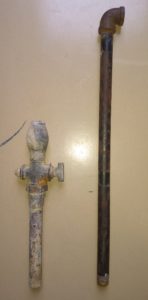By Howard Neukrug, December 4, 2018, Professor of Practice, The University of Pennsylvania
There are hundreds of thousands of residential lead pipes still in use in Pennsylvania, especially in older neighborhoods where persons of color, seniors or economically disadvantaged citizens often reside. Over time, lead may leach from the pipe surface into the home drinking water supply causing serious health problems, particularly for children. While great strides have been made reducing lead levels from our environment in other areas including leaded gasoline, lead paint, contaminated soils, industrial smokestacks, and water, lead pipes remain a legacy asset, the replacement of which has been largely ignored.
Instead, the approach to date has primarily been to educate homeowners about the dangers of the lead pipes and to create financial incentives and assistance to encourage homeowners to replace their lead service lines. Despite these incentives and assistance, the cost of pipe replacement is just too high for the average homeowner, particularly for Pennsylvania’s rural and urban poor who often live in older neighborhoods where replacement of lead service lines is needed most.
Similar to lead pipes, broken laterals that cause sewage back-ups into basements and leakage into the groundwater are also often not replaced due to high cost, and often not even temporarily repaired.
Pennsylvania’s water infrastructure is aging and in need of replacement – not just repair. Pipe breaks and service outages are well known to residents, businesses and politicians throughout our state. The cost to upgrade water and sewer pipe networks across the US may be over $2 Trillion! As a result, there will be significant pressure to raise water rates to cover these costs, despite the fact that an increasing number of Pennsylvania residents already find it difficult to balance the costs of basic needs such as water, food, rent and medicine. Increased water rates due to replacement of residential lead service lines and/or damaged wastewater laterals may make balancing household budgets impossible and lead to devastating financial impacts such as foreclosure. This issue is real. Even the author of this blog had to figure out how to pay for his own damaged sewer pipe just this month!
Fortunately, there is good news coming out of Harrisburg. Governor Wolf signed Act 120 into law, at last providing the financial and legal mechanisms for Pennsylvania’s private water utilities (eg Aqua Pa, Pa American, SUEZ) to replace residential-owned lead service lines and damaged wastewater laterals. For the owner of a home with early 20th century pipes, this will help relieve costs that can go as high as $20,000 in plumbing fees. The costs of these community-wide replacement programs will be recovered through water tariffs. This provides an incentive for utilities to move ahead with replacement programs and provides a mechanism to share the cost across the larger customer base.
By removing lead pipes that provide drinking water, we can, as a society, greatly reduce the public’s exposure to lead in drinking water and thus the ravages of lead accumulation in children’s bloodstreams. By replacing cracked or blocked wastewater pipes leaving a residential property, we can greatly reduce the environmental harm caused by contaminated sewage leaking into the groundwater – or into people’s basements.
Thankfully, Act 120 now improves environmental and public health for at least a portion of Pennsylvania residents – those serviced by private water utilities and regulated by the Pennsylvania Utility Commission (PUC). But private water utilities service only 12% of America’s homes, the rest are serviced by publicly-owned water utilities. Now we need to figure out how to do the same thing to benefit our public water systems in areas such as Philadelphia, Pittsburgh and Scranton. Act 120 is a big step in the right direction. Stay tuned for Act Two!
Howard Neukrug is the former Commissioner and CEO of Philadelphia Water, where he was responsible for all aspects of decisions for its drinking water/wastewater/stormwater system serving 2.3 million people. At Penn, he is the director of The Water Center and academic professor of practice.
The Water Center’s mission is to support the resiliency and sustainability of our cities through collaborative and innovative research focused on integrated urban water policies and practices, water sciences, systems management, technology and water ecology.







Hi! I want to buy a house but I’m scared the pipes are lead.
Is there a program to replace my pipes for free or something if I do buy a house?
Thanks for any info.
Thanks for your blogIs there a program to replace my pipes for free or something if I do buy a house.Thanks for any info.
Great news! I would share this with my friends who live there.
I had to change the water pipe lead from district inside the home
There is finally some good news for Pennsylvania residents who are concerned about the legacy of lead pipes in their homes:
We appreciate you sharing this important bit of information with us regarding lead pipe replacement for Pennsylvania residents. Truly a great news to those who need it. Looking forward to the next one!
Dear Professor Neukrug,
Thank you for your insightful article on lead pipe replacement in Pennsylvania. Your work is greatly appreciated.
Excellent article about residential lead pipes in Pennsylvania with a lot of useful info. This helped me a lot. Thank you. Reply from All Shops Directory user.